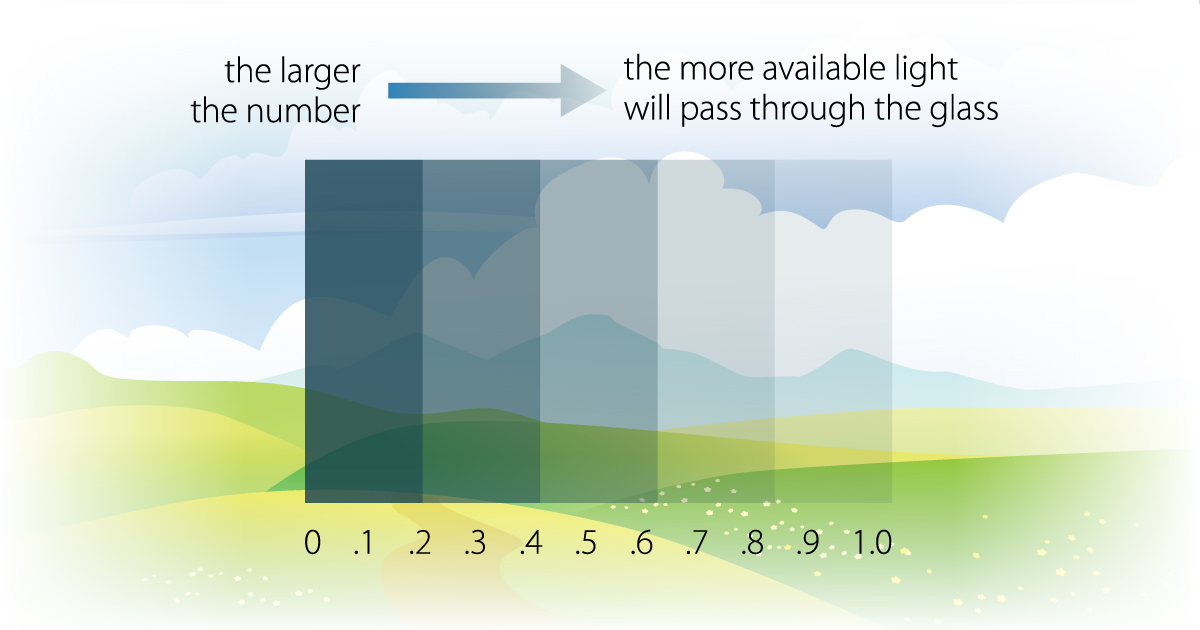Insights > Category > Posted: 2025-Mar-21, Updated: 2025-Mar-31
Performance Rating
Solar Heat Gain (SHGC)
Definition
The Solar Heat Gain Coefficient (SHGC) measures how much solar radiation (heat) passes through a window into your home. Expressed as a number between 0 and 1, SHGC helps you control the amount of solar heat entering a living space.
- 0 indicates the least amount of heat allowed through the window.
- 1 indicates the most amount of heat allowed through the window.
Understanding solar heat gain
Understanding and choosing the right SHGC for your windows can enhance your home's energy efficiency, comfort, and protection, while potentially reducing energy costs and environmental impact.
Solar gain occurs through:
- Direct Solar Radiation: Heat from the sun entering through the window.
- Absorbed Solar Radiation: Heat absorbed by the window and transferred into a home through the glazing and framing materials by conduction, convection, and radiation.
While solar gain can provide free heating in the winter, it can lead to overheating in the summer. Note: there is no solar gain at night.
Controlling solar heat gain
Window and glass manufacturers offer various tinting and coatings to control the SHGC, allowing you to balance solar heat gain with your comfort needs. The right SHGC value depends on several factors:
- Climate: Ottawa’s cold winters and warm summers require careful consideration.
- Window Orientation: North, south, east, or west-facing windows will have different impacts.
- Shading: External and internal shading devices can help manage solar gain.
Why is solar heat gain important when buying windows?
Solar heat gain is an important factor when buying windows because it directly impacts your home's energy efficiency, comfort, and overall heating and cooling costs. Here’s why it matters:
Energy Efficiency:
Heating Costs: In colder climates or during winter, higher solar gain can help reduce heating costs by allowing natural sunlight to warm your home. This can lower your reliance on heating systems and save on energy bills.
Cooling Costs: Conversely, in warmer climates or during summer, lower solar gain helps reduce cooling costs by minimizing the amount of heat entering your home. This can help maintain a cooler indoor temperature and reduce the need for air conditioning.
Comfort:
Temperature Control: Properly managing solar gain can help maintain a comfortable indoor temperature throughout the year. High solar gain in winter can provide free warmth, while low solar gain in summer can prevent overheating.
Glare Reduction: Windows with appropriate SHGC can also help reduce glare from direct sunlight, improving indoor comfort and visibility.
UV Protection
Fading of Furnishings: Solar gain can influence the amount of ultraviolet (UV) radiation entering your home. High solar gain can increase UV exposure, which may cause fading of carpets, furniture, and other interior furnishings. Windows with lower SHGC values or special coatings can help mitigate UV damage.
Environmental Impact
Sustainability: Efficient solar gain management can contribute to reducing the overall energy consumption of your home, which in turn reduces your carbon footprint and supports environmental sustainability.
Cost-effectiveness
Long-Term Savings: Investing in windows with the right SHGC for your climate and needs can lead to long-term savings on energy bills. While the initial cost might be higher, the improved energy efficiency can provide significant cost savings over time.
SHGC summary for Ottawa
- A higher SHGC number means greater solar gain (more heat).
- A lower SHGC number means less solar gain (less heat).
Related stories
Need more information?
Choosing the right SHGC can enhance energy efficiency and comfort in your home year-round. Consider consulting with a professional to find the best solution for your specific needs.
Efficient - INFOGRAPHIC
INFOGRAPHIC
Understanding Ratings
CDN Climate Zone
Comparing Products
Visual Transmittance (VT)
Solar Heat Gain (SHGC)
Energy Star (ER)
Air Leakage (AL)
R-value of Insulation
U-factor (U-Value)
Spectrally Selective Coatings
Low-E Coatings
Gas Between the Panes

